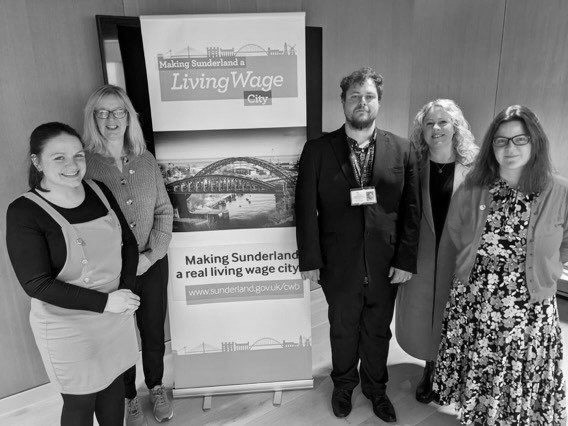Over the last few months, I have become aware, while working as a community development practitioner in the Durham Diocese, that the wonderful staff and volunteers are increasingly expressing that they are exhausted and angry.
Loughborough University has found that North East now has the highest child poverty rates in the country, with over 50% children growing up in poverty in some communities. Child Poverty rates in the region have risen by almost half, from 26% to 38%, in the space of six years compared to a drop by two percentage points across the country [1]
I was reflecting on this when I came across an old report from the Church Urban Fund that looked the problems facing community organisation in the most deprived areas. It described:
‘Significant issues confronting people living in deprived communities – The most common problems cited by respondents included high levels of unemployment, especially amongst young people; reductions in benefits coupled with rising rent, food costs and bills; increasing levels of homelessness, and rising levels of debt’.[2]
What, however, most shocked me about the report was not the content – but the fact that it was written ten years ago! The austerity years, the COVID-19 years, and now the current economic crisis. Each wave of crisis has seen congregations and faith-based organisations pick themselves up and do what they can. Food provisions, debt advice, drop-in support, and warm spaces.
The congregations and projects I support are increasingly growing exhausted, not knowing what to do next or where to turn. This exhaustion has been highlighted by a recent article in The Guardian:
“Many of our teams are struggling to cope as demand for our support outstrips our food and financial donations and we are forced to make difficult decisions about how we operate. We are overstretched and exhausted. Many of our organisations are at breaking point.” [3]
However, there is another emotion that I am witnessing: the anger resulting from the recognition that years of responding to human need through loving service has not changed things. Rather, it seems things are now worse than ever before, as highlighted in the child poverty statistics.
Last month an email from an area dene explained that at the deanery synod found ‘there is a desire to do more than give, [as] this cannot be accepted as the norm and collectively we would like to campaign but are unsure how to take this forward’. Our charitable practice doesn’t help us to seek to transform unjust structures of society. As Thia Cooper reminds us:
Charity is only needed when a situation of injustice exists. On its own, charity is not enough; it leaves the person ‘giving’ with the power. It does not ask how to achieve a just system, where no one holds greater economic, political, radical, or other types of power over another human being. (Cooper, 2007: 175) [4]
Last week was Living Wage Week. As the chair of Tyne and Wear Citizens Living Wage Action team, we will be celebrating the first Living Wage City in the region, Sunderland, and our second council, Newcastle.
This year, I have noticed a shift in the narrative around the Living Wage campaign from one of advocacy to deep solidarity. There is a deeper connection for many of us which has moved us beyond standing alongside as we are all, to varying degrees, look with concern to work out how to make ends meet. I am not playing the ‘we’re all in this together’ card, because that just isn’t true but there is a deeper solidarity.
Joerg Rieger (2017) develop the notion of solidarity into ‘deep solidarity’ when describing a situation where 99% of us who must work for a living, including people who are excluded from the job market, realise that they have this in common. Deep solidarity recognises that the system works for the few rather than for the many, and that nothing will change unless more of the many come together. It also recognises that our different religious traditions can help us imagine and reimagine deep solidarity.
At the heart of worship in Israel is the Exodus from the conditions of slavery in Egypt; this tradition ties together the three Abrahamic religions, Judaism, Christianity, and Islam. Interreligious dialogue is a live option not only because of shared traditions but also because deep solidarity helps us deal with our differences. In fact, differences become an asset when the resources of our different traditions are allowed to make their specific contributions to the struggle. (Rieger, 2017: 361) [5]
So tonight, I am off to run listening training for the deanery synod who wanted to move beyond simply giving but weren’t sure how to go about it. We will be practicing how to have conversations with people who are different from ourselves with such an understanding of deep solidarity.
[1] https://www.nechildpoverty.org.uk/news/north-east-child-poverty-now-highest-in-the-uk
[2] Church Urban Fund (2012) Survival strategies: a survey of the impact of the current economic climate on community organisations in the most deprived areas of England. London: Church Urban Fund. Available at: https://cuf.org.uk/resources/survival-strategies-a-survey-of-the-impact-of-the-current-economic-climate-oncommunity-organisations-in-the-most-deprived-areas-of-england (Accessed: 11 May 2020).
[4] Cooper, T. (2020) A Theology of International Development. London: Routledge.
[5] Rieger, J. (2017) ‘Empire, deep solidarity, and the future of liberation theology’, Political theology: the journal of Christian socialism, 18(4), pp. 354-364. doi:10.1080/1462317X.2017.1311060.
More blogs on religion and public life
- “Barnabas Thrive” led by Revd Dr Paul Monk, is awarded Kings Award for Voluntary Service
by Matthew Barber-Rowell - How could a Temple Tract have had even more traction?
by Simon Lee - Remembrance Day: Just Decision Making II
by Matthew Barber-Rowell - Trustees Week 4th Nov – 8th Nov 2024
by Matthew Barber-Rowell - Some ancient wisdom for modern day elections
by Ian Mayer

Discuss this